Simplified technology helping to keep vulnerable adults connected
Technological advancements have seen the growth of devices being specially created for older people and those with disabilities.
Ensuring that vulnerable older adults and those living with various health conditions are supported and connected at all times, including times of crisis can be crucial.
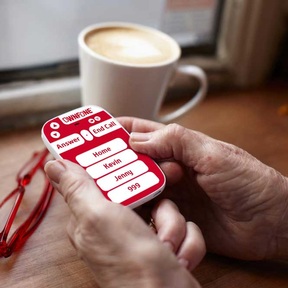
Technology companies such as Own Fone and Doro are leading the way in providing mobile technology that is easy to use, accessible and appropriate.
Own Fone was established four years ago and lends itself to being used by older people. Designed for people who don’t want to or don’t need to text or use the internet, the device makes it simple for its users to keep in touch with members of their family and friends.
Sales director at Own Fone, Sarah Watts commented: “Each phone is unique to that person’s needs, they are printed using a specialist printer, allowing them to be made to each user’s needs. Phones can have names, images, high-visibility or text for people who are visually impaired and can have braille or raised text. They arrive with the customer with contact numbers pre-programmed and pre-charged, holding their charge for three to five days with standard usage.
“Though the phone design is quite simple, the technology behind the phone is unique and phones can be customised remotely by Own Fone, allowing people to update the numbers should they need to be changed, while also preventing numbers being changed or deleted by mistake.”
They work with a number of charities on a local and national level, including: Age UK, Stroke Association, Diabetes UK and Guide Dogs for the Blind, allowing people to visit their websites and design their Own Fone and put in all their numbers and details.
In recent years, they have been working with Comic Relief funded project, Dementia Diaries to provide an outlet for people living with dementia to store and record their daily experiences. The Dementia Diaries project acts as a resources to help inform people about the lives and experiences of people living with different stages of the condition.
'Providing a ‘lifeline’ to vulnerable people'
Recently Own Fone launched ‘Footprint’, which uses a roaming sim card and operates as a GPS tracker and a mobile phone. By pushing the middle button on the device, users can dial the phone that it is connected to, sending it a text at the same time with the amount of battery left on the device and Google Map coordinates of where that unit is at that time.
The device is suitable for use by councils and companies with lone-workers such as care workers, district nurses who may also be vulnerable when working in their local communities, as well as vulnerable adults.
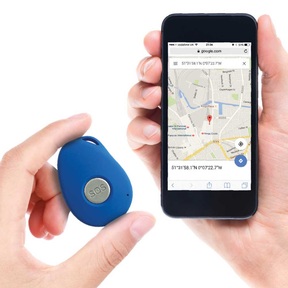
Ms Watts explained: “Footprint has a speed sensor and a fall sensor and allows users to establish a radius around the home of the person using it, ensuring that if the person using Footprint leaves that radius then the contact number connected to the device is alerted, making it ideally suited to people living with dementia who may wander.
“Footprint gives people the freedom to get out and about as traditional telecare systems only work within a short distance of the home.”
Ms Watts said: “We have around 4,000 customers using our products as well as hospitals, local councils and care providers. Due to the nature of our business, often our customers are usually only with us for around three years, so we have probably helped a lot more people over the years.
“As a small company, very few people know we exist and the majority of our customers are older people. We sell to care companies, providing Own Fone’s for telecare services allowing people to contact their telecare company easily.”
Own Fone use a Mobile Virtual Network Operator (MNVO) and offer users 30 day rolling contracts which can be modified and tailored to each person’s needs, ensuring people can communicate when people need to.
Own Fone uses the Vodafone network, while roaming sim cards are available for people who may not have such good coverage in their local area, which can be particularly useful for telecare customers.
Ms Watts continued: “It’s so important that people do have coverage all the time for this type of product as they could be used in life or death situations.
“We’re members of the Telecare Services Association (TSA) and the British Healthcare Trading Association (BHTA) and we subscribe to their code of conduct as we know we’re providing a ‘lifeline’ to vulnerable people.
“Sometimes our customers call us and tell us how much our products have helped them and their loved one, it’s nice to be appreciated and to know that the product we make actually makes such a different to people’s lives.”
Accessible devices for people of all ages
Swedish based Doro provide ‘easy to use’ mobile phones that resemble standard mobile phones but often feature larger buttons and larger text and simplified features for their users.
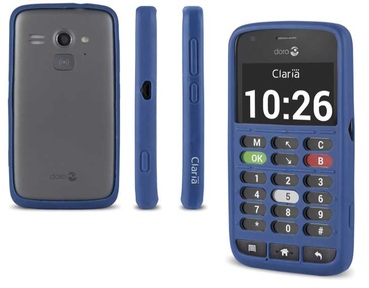
A spokesperson for Doro commented: “Doro’s philosophy is to make positive differences to everyday life by making technology simpler and easier to use. Doro produces innovative products and services that have the customer’s user experience at the core.
Doro produce a range of products including: smartphones, feature phones and Carephones, suitable for users with a range of needs both in and outside of the home. They contain key functions such as call, text and a torch, while some have large keypads, hearing aid compatibility, amplified sound and HD voice, recognising the need for high-quality sound for older users who may have hearing difficulties.
Some designs have talking numeric keys to allow users to hear which numbers are being pressed and feature an emergency assistance key to alert a friend or relative if they have fallen or need help.
Phones come with an embedded app to help family members or friends to remotely access the phone to set up the device or amend the settings. Doro’s Connect & Care feature allows friends and relatives to monitor user’s behavioural patterns and provide family members with alerts if irregularities are detected.
Commenting on the need for feature phones, managing director at Doro UK, Chris Millington said: “There is still a need for feature phones. Upgrading to a full-smartphone does not suit everyone – many people in our target group want a well-designed device for calling and texting, with some additional digital functions. Facebook and Twitter are mainstream technology and these devices bring accessibility of this popular media to people of all ages.”
For more information on Own Fone and Footprint, visit: http://www.ownfone.com/ or to read more about Doro, visit: http://www.doro.co.uk/
Latest Innovative Care News
 13-May-19
'Pink drink' brain cancer treatment rolled out across NHS in memory of Baroness Jowell
13-May-19
'Pink drink' brain cancer treatment rolled out across NHS in memory of Baroness Jowell
 25-Apr-19
Louis Tomlinson helps 83-year-old who lost wife to dementia complete bucket list
25-Apr-19
Louis Tomlinson helps 83-year-old who lost wife to dementia complete bucket list
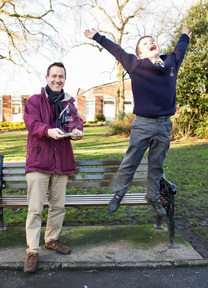 05-Mar-19
Care worker of the year inspires nine-year-old son to work in care
05-Mar-19
Care worker of the year inspires nine-year-old son to work in care
 12-Feb-19
Michael McIntyre's jokes tested to see if they stop elderly catching flu
12-Feb-19
Michael McIntyre's jokes tested to see if they stop elderly catching flu
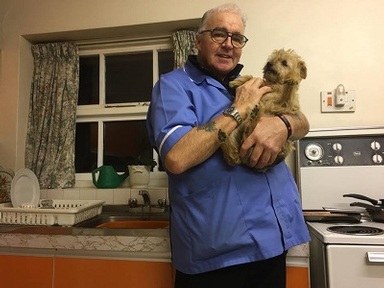 25-Jan-19
Ninety-year-old and his dog can stay together, thanks to care worker
25-Jan-19
Ninety-year-old and his dog can stay together, thanks to care worker